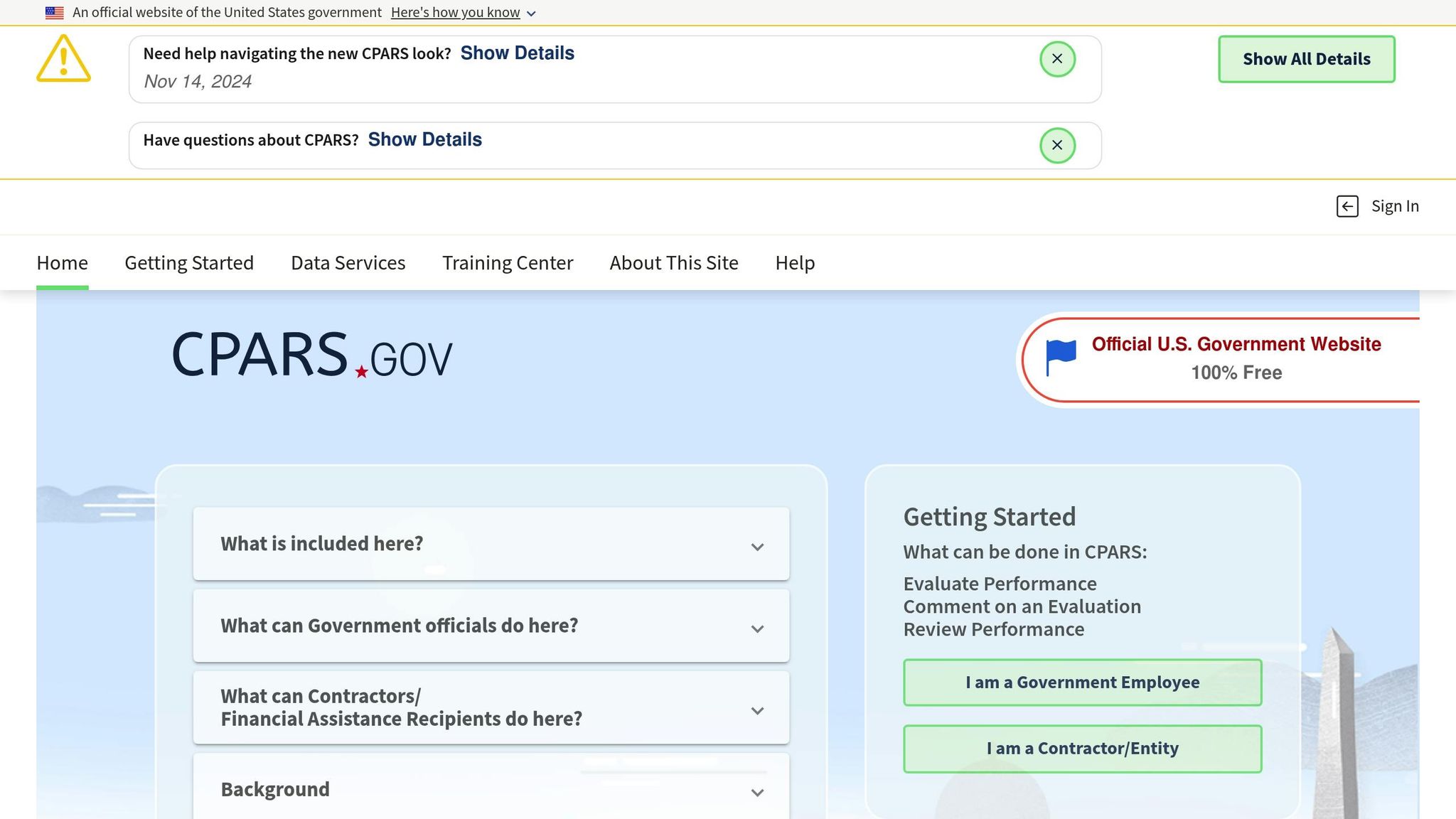Only 4% of small businesses take advantage of the $45 billion federal marketplace through GSA Schedule Contracts. Why? The process is complex, time-consuming, and full of challenges. Here’s what you need to know:
- Federal Compliance Standards: Strict rules like the Trade Agreements Act (TAA) and labor standards can be overwhelming without expert help.
- Extensive Documentation: Applications exceed 100 pages, require frequent updates, and are prone to errors.
- Financial Requirements: Businesses must prove financial stability and meet specific sales thresholds.
- Lack of Federal Experience: Without CPARS ratings, small businesses face delays and reduced chances of success.
Despite these hurdles, overcoming them can lead to steady federal revenue and growth opportunities. Tackle compliance, streamline documentation, prepare financially, and leverage private sector experience to improve your chances.
What Are GSA MAS Contract Vehicles and Why Small Businesses Should Be On Them
1. Meeting Federal Compliance Standards
Navigating federal compliance standards can be a major hurdle for small businesses. In fact, only 4% of small businesses are listed on GSA Schedules. This makes understanding and adhering to key regulations absolutely critical.
Key Federal Regulations
Some of the most important regulations to be aware of include the Trade Agreements Act (TAA), which mandates that products and services come from TAA-compliant countries. Other crucial rules cover federal labor standards and subcontracting requirements. Failing to comply with these regulations can lead to serious consequences, such as contract termination, hefty fines, or even debarment.
Working with Compliance Experts
Because federal compliance can be so intricate, working with experts in the field can make a huge difference. For example, GSA Focus offers comprehensive services, including document preparation, compliance checks, and negotiation support, all designed to help businesses navigate these complexities. Staying compliant not only reduces risks but also lays a strong foundation for long-term success in the federal marketplace.
2. Required Documentation
For small businesses, managing documentation for GSA applications can feel overwhelming. Applications often run over 100 pages, and the need for frequent updates only adds to the workload.
Common Application Mistakes
Errors in documentation can lead to starting the entire application process over, costing valuable time and resources. One of the most common mistakes? Using outdated forms. Josh Ladick, Founder of GSA Focus, highlights the frustration:
"Reading through (literally) 100+ page forms… And when you finish, a new version is released".
Document Management Solutions
Avoiding these errors requires a solid document management plan. Preparing GSA documentation can take more than 100 hours, so having a systematic approach is key. Here are some steps to streamline the process:
- Centralize your documents: Use tools with version control and automated reminders for renewals.
- Leverage expert support: Services like GSA Focus can cut preparation time by 4–6×, helping ensure accuracy in document preparation, submission, and ongoing maintenance.
With only 4% of small businesses holding GSA contracts, having an efficient document management system can make all the difference in succeeding in federal contracting.
sbb-itb-8737801
3. Meeting Financial Requirements
Small businesses aiming for GSA contracts often face financial challenges that can impact their eligibility and overall success. Being well-prepared for these financial demands is a critical step in the GSA Schedule application process.
Sales Thresholds and Requirements
A major hurdle is demonstrating a consistent commercial sales record that reflects business stability. GSA contracts, unlike many commercial agreements, typically offer shorter sales cycles and more predictable payment terms, which can be a significant advantage.
To meet these benchmarks, businesses need to focus on careful preparation. Let’s explore how to approach this.
Financial Preparation Steps
Tackling financial requirements effectively requires thoughtful planning and resource management. Here are some key strategies:
Revenue Management
- Focus on maintaining high client satisfaction to ensure steady and reliable sales.
- Keep detailed financial records that clearly showcase your business’s stability and revenue history.
This level of financial discipline lays the foundation for success in the GSA contracting space.
Strategic Support
Collaborating with GSA contract specialists can ease the burden of navigating the application process. These experts can help with complex financial documentation, troubleshoot compliance issues early, and streamline resource allocation. For instance, working with consultants like GSA Focus can be a smart move once financial priorities are clearly established.
Building a strong federal contracting profile by gaining experience with federal contracts is the next step in strengthening your position.
4. Building Federal Contract Experience
Once your financial readiness is in place, the next hurdle is proving your federal contract experience. This isn’t always straightforward. In fact, a 2023 GAO report revealed that 68% of GSA Schedule awards go to contractors with CPARS profiles.
Understanding CPARS Impact

CPARS (Contractor Performance Assessment Reporting System) ratings are a pivotal factor for contracting officers when assessing potential contractors. Without a CPARS record, small businesses often face serious setbacks – penalties in scoring, rejected bids, and weaker negotiating positions. Essentially, CPARS serves as a risk management tool for contracting officers, putting newcomers at a clear disadvantage.
Here’s the reality: businesses without CPARS records take an additional 6–8 months to secure awards. Even worse, first-time applicants without CPARS win 65% less often than those who have it. While this may seem like a roadblock, small businesses can bridge the gap by leveraging their private sector experience.
Using Private Sector Experience
Federal agencies are increasingly open to considering commercial past performance. The numbers speak for themselves: acceptance of private sector experience rose from 58% in 2020 to 72% in 2023. To make the most of this opportunity, businesses should strategically document their private sector projects.
One effective strategy is employing the STAR-FAR method to align commercial work with federal requirements:
-
Situation and Task Assessment
Highlight project details that match federal standards and expectations. -
Action Documentation
Provide measurable metrics and demonstrate adherence to compliance standards. -
Results Alignment
Translate your commercial success into achievements relevant to federal needs. For instance, a cybersecurity company increased its win rate by 40% after incorporating ISO 9001-certified quality reports into its experience documentation.
"Contracting officers typically spend less than 4 minutes reviewing experience sections, making clear FAR alignment critical", explained a GSA contracting officer.
When documenting your experience, focus on projects completed within the last 3–5 years, prioritizing those valued over $500,000. Smaller-scale work often gets overlooked. Including detailed performance metrics and thorough documentation can make all the difference in boosting your competitiveness for GSA contracts.
Conclusion: Steps to GSA Contract Success
Breaking into the federal marketplace through a GSA contract takes preparation and strategy. With only 4% of small businesses on GSA Schedules and $45 billion in federal spending, tackling the challenges head-on is essential to compete effectively.
Here are three critical areas to prioritize:
Compliance and Documentation Management
Accurate and detailed documentation is a must. Since 44% of government awards receive only one bid, having well-prepared paperwork that aligns with federal standards can give your business a competitive edge. Expert assistance can help you meet these requirements and avoid unnecessary delays.
Financial Preparation
Planning your finances carefully can pay off – businesses with GSA contracts often secure an average of $927,000 in steady revenue.
Experience Documentation
Leverage your private sector achievements to build strong federal credentials. This helps showcase your expertise and suitability for government projects.
FAQs
What steps can small businesses take to comply with federal requirements for GSA contracts?
To align with federal compliance standards for GSA contracts, small businesses should concentrate on a few essential steps:
- Get familiar with GSA rules: Take the time to understand the General Services Administration’s guidelines, including pricing policies, product or service eligibility criteria, and reporting requirements.
- Ensure precise documentation: Double-check that all necessary paperwork – like financial statements, past performance records, and pricing details – is complete and accurate.
- Comply with federal regulations: Follow laws such as the Trade Agreements Act (TAA) and verify that your business meets any relevant industry standards.
Focusing on these areas can position your business to better navigate the GSA contracting process and tap into federal opportunities.
What can small businesses do to handle the complex documentation process for GSA Schedule applications?
Managing the mountain of paperwork involved in GSA Schedule applications can feel daunting, especially for small businesses. One way to ease the burden is by partnering with specialists who understand the ins and outs of the process. These experts can help with everything from preparing required documents to ensuring compliance with federal regulations, making the entire application process much smoother.
With their guidance, small businesses can save time, cut down on stress, and concentrate on seizing federal contracting opportunities – without getting stuck in the maze of administrative tasks.
How can small businesses use their private sector experience to strengthen their federal contracting profile without a CPARS record?
Small businesses can tap into their private sector expertise to establish a compelling presence in federal contracting by focusing on a few key approaches. One of the most important steps is to highlight past performance in related industries. This means showcasing successful projects, providing measurable results, and including client testimonials. Even without a CPARS record, this can effectively demonstrate your ability to deliver high-quality outcomes.
Another critical step is crafting a well-thought-out capability statement specifically tailored to federal agencies. This document should clearly outline your expertise, past accomplishments, and adherence to federal requirements. Additionally, building relationships with agency representatives and partnering with established government contractors as a subcontractor can be invaluable. These connections not only help you gain experience but also bolster your credibility in the federal contracting space.
Related posts
- Key Terms in GSA Contracts Explained
- GSA Contract Eligibility: Key Requirements
- How to Access GSA Small Business Support Programs
- What Is a GSA Contract and Why Should Small Businesses Care?


